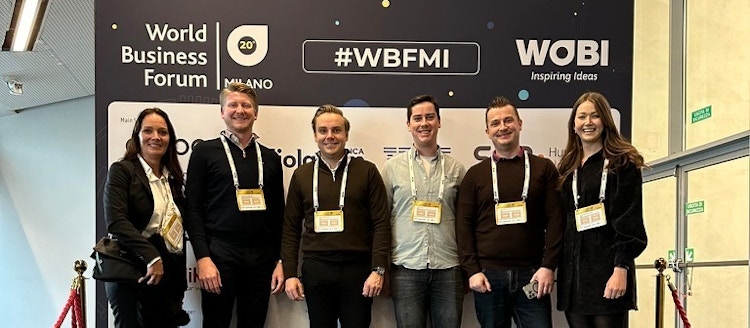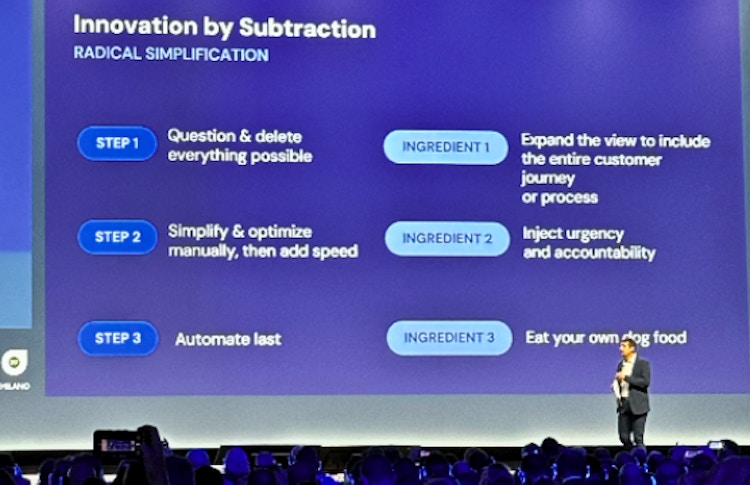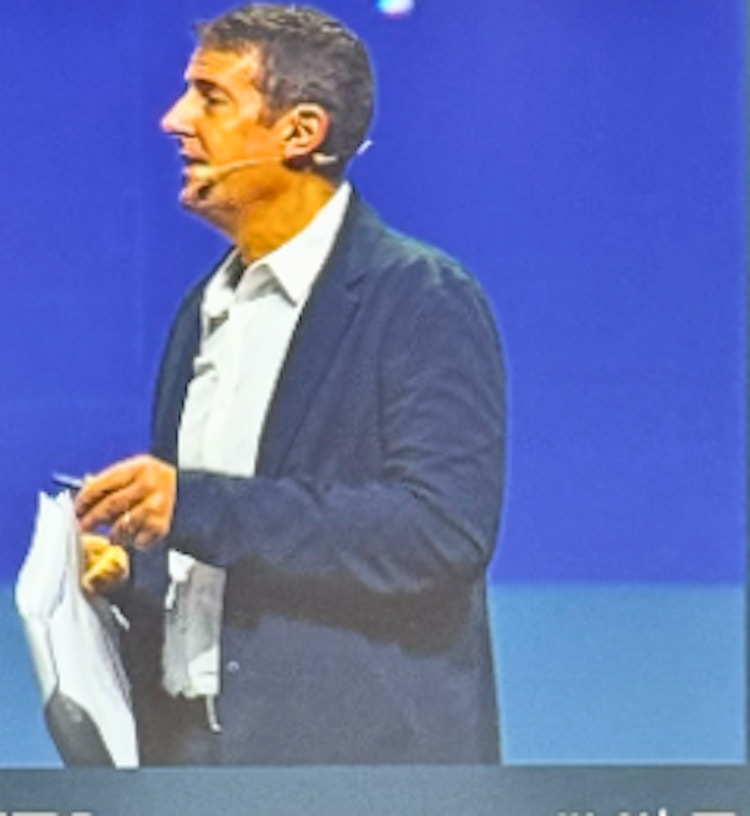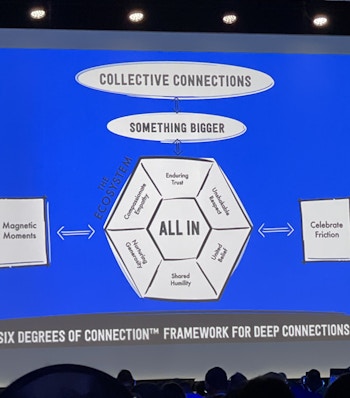World Business Forum 2023 Milano
Inger Lise Øhman Meisingset, Sharon Mari Sandberg Olsen, Fredrik Lindahl Roppestad, Christoffer Øistad, Calle Veale og Eirik Alne

In November 2023, some of the team leaders from Evidi Accelerate travelled to Milan to participate in the World Business Forum, an annual two-day event organized by a global organization promoting knowledge and innovation in businesses.
The conference focuses on topics most relevant to today's leaders, stimulating innovative thinking and inspiring action. Over 2500 participants from various industries and countries gathered at the conference, learning from and being inspired by renowned speakers from the business world.
This year's theme was “Purpose, navigating uncharted waters,” addressing how purpose serves as the launching pad for success. It provides a clear direction and a concrete goal for the future, inspiring innovation and creativity in individuals and businesses alike. A shared purpose enables us to reach any goal.
Among the ten skilled speakers at the conference, several left a lasting impression:
- Francis Ford Coppola, film director, discussed creativity and how he created some of the most iconic films in history.
- Michael Phelps, the most decorated Olympian of all time, shared his story of high achievement and mental health.
- Muhammad Yunus, Nobel Prize winner and founder of Grameen Bank, presented his concept of social entrepreneurship and sustainability.
- Francesca Rossi, research director for IBM and professor of artificial intelligence, explained how AI can be used to address global challenges.
- Jean Oelwang, CEO of Virgin Unite, demonstrated how relationship leadership can create positive changes in the world.
Exciting case studies from Nike and Tesla were presented, along with insights into leadership, diversity, motivation, and more from several skilled speakers.
Simplification - Tesla as an Innovation Company
Jon McNeill shared his experiences and lessons from working with Elon Musk and Tesla, a company known for its controversial nature and revolutionary contributions to the automotive industry through electric cars.


Simplification as the Key to Innovation
McNeill explained how Tesla uses a method called "the algorithm" to lead innovation, continuously asking "why" and simplifying goals, requirements, processes, and products. He provided examples of how Tesla reduced clicks, choices, and parts to increase sales, production, and customer satisfaction. Fewer choices lead to more decisions.
Speed as a Measure of Quality
The importance of optimizing and accelerating processes to achieve high quality and a competitive advantage was emphasized by McNeill. He shared how Tesla learned from Japanese companies to optimize the production process and introduced "Tesla mobile service" to save costs and enhance the customer experience. Tesla faced the challenge of saving resources and time without compromising service quality, resulting in more efficient deliveries and simultaneously happier customers.
Automation as the Final Step
McNeill recommends avoiding early automation and prioritizing testing, innovation, and optimization first. He points out that automation can be expensive and may lock the organization into a solution that may not be optimal if implemented too early in the process.
Bold Goals as Motivation
Finally, McNeill discussed how setting ambitious and challenging goals at Tesla stretches people in a specific direction and creates loyalty. He emphasized that it's not necessarily about reaching the goal but working hard toward it and having something to strive for. A key lesson he shared was to replace "no" with "I don't know how, but I will try."
These principles are relevant to our daily work, both with clients and internal processes at Evidi. We always strive to deliver services of the highest quality quickly and efficiently. Working to optimize processes for our clients is a fundamental part of our daily efforts and a challenge we continually face.
Giving Behaviour and Inclusion – Increased Meaning Through Relationships
Nava Ashraf, a professor of economics at the London School of Economics and Political Science and research director at the Marshall Institute, has conducted several field experiments in Africa, Asia, and Latin America. Applying principles from behavioural economics, she has contributed to improvements in health, education, and microfinance.
Ashraf introduced the concept of "altruistic capital," where altruism, defined as unselfish behaviour and attitude toward others, contrasts with egoism. Cultivating altruism not only provides help to others but also builds relationships and trust networks. This can offer support, guidance, and increased productivity internally within an organization. Altruism can also contribute to increased social cohesion and a sense of community in the workplace.
In her lecture, Ashraf discussed how altruistic capital can be measured, invested, and used to influence incentives and strategies. She presented research findings from a project examining methods to limit the spread of disease. Some of the findings included:
- Recruiting healthcare workers based on their motivation to contribute to society proved to yield better results and reduced turnover compared to recruitment based on career opportunities.
- Non-financial rewards, such as recognition and gratitude, had a greater impact on the sale of health-promoting aids for healthcare workers than financial rewards.
- Offering healthcare workers autonomy and flexibility in their work resulted in increased productivity and satisfaction.
- Promoting collaboration and trust among team members in an organization led to higher performance and reduced conflicts.
Ashraf argued that leaders should consider altruistic capital when planning and implementing organizational strategies, proposing some measures to do so:
- Communicate the organization's vision and purpose clearly and regularly to employees.
- Involve employees in initiatives that have a positive impact on workplace culture and society, showing the results of their efforts.
- Create an inclusive and diverse work culture where employees feel valued and respected for their unique strengths and perspectives.
- Provide employees with feedback, recognition, and support for their efforts and achievements.
- Encourage employees to take initiative, experiment, and learn from mistakes.
She concluded that altruistic capital is a valuable resource for increasing productivity and engagement in the workplace, providing employees with a sense of inclusion and purpose in their work.
Relationship Leadership
Jean Oelwang, president of Virgin Unite, concluded with a lecture on relationship leadership. She researches how building friendships and deep relationships in the workplace is an unlimited superpower in the business world. It is critical not to underestimate the importance of a safe work environment with close relationships with one or more colleagues, and we see evidence that this works repeatedly.
Safe, close relationships yield greater benefits than professional competence alone. There is no one-size-fits-all solution for creating these relationships, but spending time together physically is a fundamental step. The reality is that we spend more time together digitally, making it more challenging and time-consuming to build these important relationships with our colleagues.

From Inspiration to Action
World Business Forum was an inspiring and educational experience, and we have brought back new knowledge and inspiration to Evidi. We are motivated to use what we have learned to improve our own performances, teams, and organization. Subsequently, we conducted a workshop where reflections were shared, resulting in a set of changes we want to implement in our organization, along with inspiration for future work.
Do you wish to learn more about how we are moving forward with these changes?
Explore our website or get in touch with our skilled advisors!